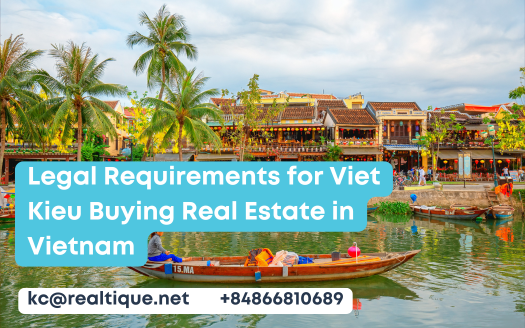Legal Requirements for Viet Kieu Buying Real Estate in Vietnam
Vietnam’s real estate market is flourishing, and Viet Kieu (overseas Vietnamese) are taking advantage of the opportunities to own property in their homeland. While the process is more straightforward for Viet Kieu compared to other foreigners, there are still essential legal requirements to navigate. This guide provides a detailed breakdown of everything you need to know to ensure a smooth and lawful property purchase in Vietnam.
Table of Contents
Understanding the Legal Framework for Viet Kieu Property Ownership
Who Qualifies as Viet Kieu?
Viet Kieu refers to overseas Vietnamese, including those holding foreign citizenship but with Vietnamese ancestry. The 2014 Housing Law grants Viet Kieu certain privileges, enabling them to purchase and own real estate with fewer restrictions than other foreigners.
Types of Ownership Allowed
Depending on your status, you may be eligible for:
- Freehold Ownership: If you hold Vietnamese citizenship or dual nationality, you can own property indefinitely, similar to local citizens.
- Leasehold Ownership: If you don’t have Vietnamese citizenship but can prove your Vietnamese origin, you can lease property for up to 50 years (renewable).
Government Regulations
The government has strict controls to ensure property ownership aligns with national interests. Regulations include:
- A limit on the number of units a Viet Kieu or foreigner can own in a single apartment building (not exceeding 30% of total units).
- Restrictions on property purchases in certain military or high-security areas.
Essential Documents
Before purchasing property, ensure you have the following:
- Valid Passport: Must include proof of Vietnamese origin or a visa allowing you to stay in Vietnam.
- Proof of Vietnamese Heritage: A certificate from the Vietnamese embassy or consulate confirming your ancestry.
How to Obtain Proof of Vietnamese Origin
If you lack proof, you can apply at a Vietnamese consulate or embassy. Required documents typically include:
- Birth certificate or family book.
- Vietnamese ID of parents or grandparents.
- Sworn affidavits attesting to your lineage.
Translation and Notarization
All foreign documents must be translated into Vietnamese and notarized. Engage a professional translator and a licensed notary to meet these requirements.
Property Types Viet Kieu Can Buy
Condominiums
The most common choice for Viet Kieu, condominiums offer modern amenities and are easier to manage. These properties are often located in urban areas like Ho Chi Minh City or Hanoi.
Landed Properties
Viet Kieu with Vietnamese citizenship can purchase landed properties, such as villas and townhouses. However, this option is unavailable for those with leasehold ownership.
Commercial Properties
If you plan to establish a business, Viet Kieu can also purchase commercial properties. Be aware that additional regulations may apply, depending on the industry and location.
Off-Plan Properties
Buying off-plan (under construction) can be a cost-effective option. Ensure the developer has proper approvals and a good track record
Steps to Comply with Ownership Regulations
Step 1: Verify Eligibility
Confirm your status as a Viet Kieu with the necessary documents. Consult with legal professionals to ensure compliance with ownership regulations.
Step 2: Choose the Right Property
Engage a reputable real estate agent familiar with Viet Kieu transactions. They can help identify properties that meet your needs and align with legal requirements.
Step 3: Understand Sales and Purchase Agreements (SPA)
The SPA is the contract between the buyer and the seller. Review it carefully, as it outlines:
- Payment schedules.
- Ownership transfer timelines.
- Developer obligations for off-plan properties.
Step 4: Submit for Pink Book
The Pink Book is the official ownership certificate. Developers are required to submit all necessary documents to the government on behalf of buyers. Ensure you follow up to secure this critical document.
Taxes and Additional Legal Considerations
Taxes on Property Purchase
- Value-Added Tax (VAT): 10% of the property value.
- Registration Fee: 0.5% of the property value.
- Personal Income Tax (if selling): 2% of the transaction value.
Legal Fees
Expect to pay for:
- Notarization services.
- Lawyer consultation fees (optional but recommended).
- Document translation and processing.
Bank Transfers and Currency Restrictions
Vietnam has strict currency controls. Ensure that funds transferred for property purchases comply with these regulations to avoid legal issues.
For Viet Kieu, buying real estate in Vietnam is a meaningful investment and a way to reconnect with your heritage. Understanding the legal requirements, gathering the right documents, and complying with government regulations are essential to ensure a smooth process.
If you’re ready to begin your property journey in Vietnam, contact our expert team at Realtique for professional guidance. Don’t forget to subscribe to our newsletter for the latest insights into Vietnam’s real estate market!





